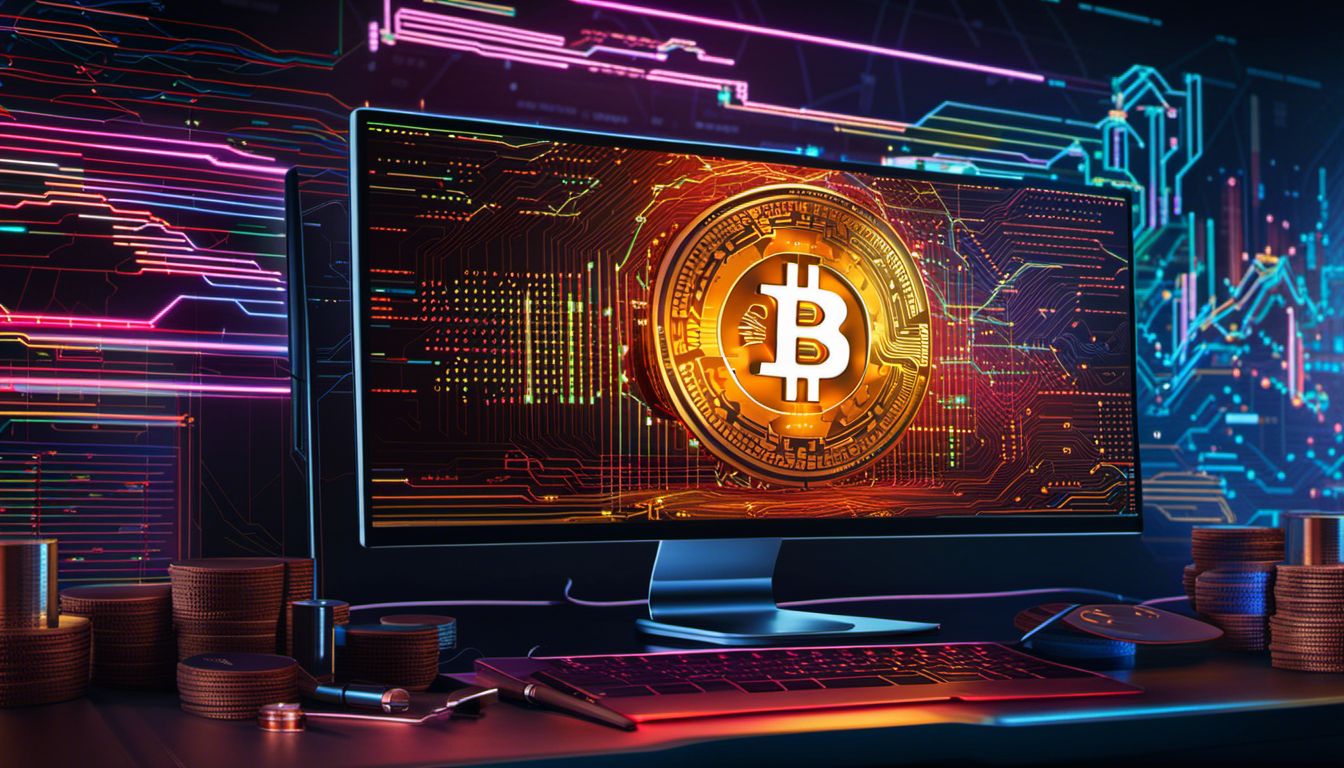Navigating the world of cryptocurrencies can be daunting, especially when dealing with Bitcoin – a digital currency that has taken the global financial system by storm. Created in 2009 by an elusive figure under the pseudonym Satoshi Nakamoto, Bitcoin operates on innovative blockchain technology and offers alternative payment methods outside conventional banking systems.
This article will demystify Bitcoin for you, breaking down how it works, its creation and uses, and much more to help you grasp this technological revolution. Get ready to embark on your Bitcoin knowledge journey!
Key Takeaways
- Bitcoin is a digital currency that operates on blockchain technology and offers alternative payment methods outside conventional banking systems.
- It was created in 2009 by an anonymous person or group known as Satoshi Nakamoto.
- Bitcoin utilizes a process called mining, where powerful computers solve complex mathematical problems to validate transactions and add them to the blockchain.
- To utilize Bitcoin, you can buy it through online exchanges and store it in a secure digital wallet.
- Bitcoin can be used for making purchases or sending money to others without relying on traditional banks.
- Investing in Bitcoin carries risks due to its highly volatile nature, so thorough research and understanding of the market are crucial.
- It’s important to keep track of your Bitcoin transactions and take necessary security measures to protect your digital assets.
Understanding Bitcoin

Bitcoin is a decentralized cryptocurrency that utilizes blockchain technology for secure and transparent peer-to-peer transactions.
Key Takeaways
Bitcoin is not like normal money. No one controls it, not a person or a group. The name Satoshi Nakamoto started Bitcoin in 2009 but no one knows who this is. It uses something called blockchain to work.
This stores data that cannot be changed or hacked. People known as miners check all the transactions are right and add new blocks to the blockchain. When they do this, they get some Bitcoin as a prize.
Bitcoin’s Blockchain Technology
Bitcoin uses a special system called blockchain. This is like a big book that keeps all Bitcoin deals safe. Miners use computers to check each transaction and add it to the blockchain.
The blockchain makes sure everything in Bitcoin is open and honest. Once a deal goes into the blockchain, no one can change or delete it. This makes Bitcoin more secure than regular money systems.
The Creation of Bitcoin
Bitcoin was created by an individual or group of individuals known as Satoshi Nakamoto in 2008.
Who created Bitcoin?
A person or group using the name Satoshi Nakamoto made Bitcoin. This happened in 2009. Nobody knows who they really are. They made a new kind of money that only exists on computers.
Today, people all over the world use this digital money called Bitcoin.
How New Bitcoins are created

Bitcoin is created through a process called mining. Here’s how it works:
- Miners use powerful computers to solve complex mathematical problems that verify and record Bitcoin transactions.
- These solutions are known as blocks and are added to the blockchain, which is a public ledger that keeps track of all Bitcoin transactions.
- Miners compete with each other to solve these problems, and the first one to find the correct solution gets rewarded with newly created Bitcoins.
- This reward incentivizes miners to continue solving problems and securing the network.
- The number of Bitcoins created as a reward for mining decreases over time, following a predetermined schedule.
- Currently, miners receive 6.25 Bitcoins as a reward for each block they successfully mine.
- As more people participate in mining, the difficulty of the mathematical problems increases to ensure that new blocks are added to the blockchain at a consistent rate.
- This process of mining is crucial for maintaining the security and integrity of the Bitcoin network.
How Bitcoin Works

Bitcoin works by utilizing a process called mining, which involves using powerful computers to solve complex mathematical problems and validate transactions on the blockchain.
How to Mine Bitcoin
To mine Bitcoin, you need specialized hardware called ASICs. Here’s how it works:
- Set up a Bitcoin wallet: First, you need to set up a digital wallet to store your mined Bitcoins. There are different types of wallets available, such as mobile wallets or hardware wallets.
- Join a mining pool: Mining on your own can be difficult and time-consuming. Joining a mining pool allows you to combine your computing power with others, increasing your chances of earning Bitcoin rewards.
- Choose mining software: You’ll need to download and install mining software that is compatible with Bitcoin. This software helps connect your computer to the blockchain network and facilitates the mining process.
- Start mining: Once you have everything set up, you can start the mining process by running the mining software on your computer or ASIC miner. The software will perform complex mathematical calculations to validate transactions in the network and add new blocks to the blockchain.
- Earn rewards: As a miner, you earn Bitcoin rewards for successfully validating transactions and adding them to the blockchain. These rewards are given out in the form of newly created Bitcoins.
- Monitor your progress: Keep an eye on your mining operation by checking your mining software or pool’s dashboard regularly. You can track important metrics like hashrate, shares submitted, and estimated earnings.
What is proof-of-work?
Proof-of-work is a way to make sure that transactions on the Bitcoin network are valid and secure. It’s a method used by miners who compete to solve complex math problems. The first miner to solve the problem gets rewarded with new bitcoins.
This process also helps maintain the consistency of block creation in the blockchain. Proof-of-work prevents any one person or group from taking control of the network and ensures that most miners agree on what is considered a valid transaction.
Utilizing Bitcoin

To utilize Bitcoin, you can buy it through online exchanges and store it in a secure digital wallet. You can then use Bitcoin to make purchases or send it to others for peer-to-peer transactions without the need for a bank or centralized entity.
How to Buy Bitcoin
To buy Bitcoin, follow these steps:
- Find a reputable cryptocurrency exchange that supports Bitcoin purchases.
- Create an account on the exchange by providing your personal information and completing any necessary verification processes.
- Link your bank account or credit card to the exchange to fund your account.
- Once your account is funded, search for Bitcoin on the exchange’s platform.
- Choose the amount of Bitcoin you want to purchase and click the “Buy” button.
- Review your order details and confirm the purchase.
- The Bitcoin will be credited to your exchange account, where you can choose to leave it there or transfer it to a secure digital wallet.
- When choosing an exchange, consider factors such as fees, security measures, and customer reviews.
- By linking your bank account or credit card, you can easily purchase Bitcoin with traditional currency.
- Remember that investing in Bitcoin carries risks, so only invest what you can afford to lose.
How to use Bitcoin
To use Bitcoin, follow these simple steps:
- Get a Bitcoin Wallet: Start by choosing a reliable Bitcoin wallet. This is where you store your Bitcoins securely. Popular options include online wallets, mobile wallets, and hardware wallets.
- Purchase Bitcoin: Buy Bitcoin from a reputable exchange or marketplace using traditional currency like US dollars or euros. You can also receive Bitcoin as payment for goods or services.
- Send and Receive Bitcoin: To send Bitcoin, you’ll need the recipient’s Bitcoin address. Enter the address in your wallet, specify the amount to send, and confirm the transaction. To receive Bitcoin, share your unique Bitcoin address with the sender.
- Use Bitcoin for Transactions: Many online merchants and physical stores accept Bitcoin as payment for goods and services. Look for the “Bitcoin Accepted Here” logo or checkout options that allow you to pay with cryptocurrency.
- Keep Track of Your Transactions: Every transaction made with Bitcoin is recorded on the blockchain, making it transparent and secure. You can view your transaction history in your wallet and keep track of your balance.
What is a Bitcoin wallet?
A Bitcoin wallet is where you keep, send, and receive your Bitcoins. It’s like a digital version of the wallet you use to store your money. There are two types of Bitcoin wallets: software-based and hardware-based.
Software wallets are apps or programs that you can install on your computer or phone, while hardware wallets are physical devices that look like USB drives. Your Bitcoin wallet has two important keys: a public key and a private key.
The public key is like your bank account number – it’s what you share with others so they can send Bitcoins to you. The private key is like the password for your bank account – it’s what allows you to access and control your Bitcoins.
Investing in Bitcoin
Investing in Bitcoin can be a risky endeavor, as its value is highly volatile and there are no guarantees of returns.
Risks of Investing in Bitcoin
Investing in bitcoin can be risky. There are many factors to consider, such as regulatory risk, security risk, insurance risk, fraud risk, and market risk. The regulation of Bitcoin is complex and still developing, which means there could be changes that might affect your investments.
Bitcoin’s price is highly volatile and can be influenced by various factors like news events or market trends. It’s important to remember that the value of Bitcoin can go up or down dramatically in a short period of time.
Additionally, investing in cryptocurrencies and initial coin offerings (ICOs) is considered highly speculative and carries significant risks. It’s always wise to consult with a qualified financial professional before making any investment decisions involving cryptocurrencies to ensure you fully understand the risks involved.
Is Bitcoin a Good Investment?
Bitcoin can be seen as a potential investment opportunity, but it also comes with risks. It’s important to understand that the value of Bitcoin can fluctuate greatly over time and is subject to market volatility.
Additionally, there are security concerns associated with storing and safeguarding your Bitcoin. However, some investors believe in the long-term potential of Bitcoin due to its decentralized nature and limited supply.
Before investing in Bitcoin, consider your risk tolerance and do thorough research to make an informed decision.
How Does Bitcoin Make Money?
Bitcoin makes money through a process called mining. Miners use powerful computers to solve complex mathematical problems that validate transactions on the Bitcoin network. When a miner successfully solves a problem, they are rewarded with newly created bitcoins.
This is how new bitcoins are introduced into circulation. In addition to mining, people can also acquire Bitcoin by purchasing it on cryptocurrency exchanges or through peer-to-peer transactions.
Investing in Bitcoin can potentially earn money as its value has the potential to appreciate over time. So, by mining, buying, or investing in Bitcoin, individuals can make money from this popular cryptocurrency.
Bitcoin as a New Kind of Money
Bitcoin is an alternative to traditional fiat currency, offering a new kind of money that is decentralized and operates outside the control of banks or government institutions. To understand more about this revolutionary form of currency, continue reading.
An Alternative to Fiat Currency
Bitcoin serves as an alternative to traditional fiat currency like dollars or euros. Unlike these currencies, Bitcoin is not issued or regulated by any government or central authority.
Instead, it operates on a decentralized network called the blockchain. This means that transactions made with Bitcoin are recorded and verified by a network of computers rather than one central entity.
This decentralization provides several advantages over traditional currency, such as increased privacy and security, lower transaction fees, and faster international transfers. Additionally, because Bitcoin is not tied to any specific country or financial institution, it can be used for global transactions without the need for intermediaries like banks.
Overall, Bitcoin offers a new kind of money that is independent of governments and provides greater control and freedom in financial transactions.
What Makes Bitcoin a New Kind of Money?
Bitcoin is considered a new kind of money because it operates differently from traditional currencies like the U.S. dollar or euro. Unlike these currencies, which are controlled by governments and banks, Bitcoin is decentralized.
This means that there isn’t a central authority overseeing transactions with Bitcoin. Instead, people can send and receive Bitcoin directly to each other without the need for intermediaries like banks or payment processors.
Another thing that makes Bitcoin unique is its use of blockchain technology. The blockchain acts as a public ledger that records all Bitcoin transactions in a transparent and secure way.
Every transaction on the blockchain is verified by miners, who solve complex mathematical problems to ensure its accuracy.
Because of its decentralized nature and use of secure technology, Bitcoin offers benefits such as privacy, security, and lower transaction fees compared to traditional financial systems.
It also allows for easy international transfers since it’s not tied to any specific country’s currency.
Addressing Bitcoin Myths
In this section, we’ll debunk some of the most common misconceptions surrounding Bitcoin to help you separate fact from fiction. Don’t miss out on understanding the truth about this revolutionary cryptocurrency!
7 Biggest Bitcoin Myths
- Myth: Bitcoin is only used by criminals and for illegal activities.
- Fact: While it’s true that Bitcoin has been associated with illegal transactions in the past, the majority of Bitcoin users are law-abiding individuals who use it for legitimate purposes like online shopping and investments.
- Myth: Bitcoin is a bubble that will eventually burst.
- Fact: Although Bitcoin’s value can be volatile, labeling it as a bubble overlooks its potential as a long-term investment. Many experts believe that as more people adopt and use Bitcoin, its value will continue to grow.
- Myth: Bitcoin is not secure and can be easily hacked.
- Fact: While there have been instances of exchanges being hacked, the Bitcoin network itself has proven to be highly secure. The use of cryptographic techniques and decentralized blockchain technology makes it difficult for hackers to tamper with transactions.
- Myth: Investing in Bitcoin is only for tech-savvy individuals.
- Fact: Anyone can invest in Bitcoin with minimal technical knowledge. There are user-friendly platforms and apps that make buying and holding Bitcoin accessible to beginners.
- Myth: Bitcoins are created out of thin air, leading to inflation.
- Fact: Unlike traditional currencies that can be printed by central banks, new Bitcoins are created through a process called mining, which requires significant computing power and energy consumption. The number of new Bitcoins entering circulation decreases over time, leading to a limited supply.
- Myth: If I lose my private key or wallet, my Bitcoins are gone forever.
- Fact: Losing access to your private key or wallet does make it difficult to retrieve your Bitcoins, but it doesn’t mean they’re gone forever. There have been instances where people were able to recover their lost Bitcoins through various methods.
- Myth: Bitcoin has no real-world value.
- Fact: While Bitcoin doesn’t have a physical form like cash, it does hold value because people trust it as a medium of exchange. Bitcoin can be used to purchase goods and services from a growing number of businesses, both online and offline.
Securing Your Bitcoin
To keep your crypto secure, it is important to use a digital wallet that allows you to control your private keys and enable two-factor authentication for added security.
How to Keep Your Crypto Secure
To keep your cryptocurrency secure, here are some important steps to follow:
- Secure your wallet: Use a digital wallet that provides robust security features and has a good reputation in the industry. Make sure to set a strong and unique password for your wallet.
- Enable two-factor authentication (2FA): Activate 2FA on your wallet and any other accounts associated with your cryptocurrency. This adds an extra layer of security by requiring a second verification step, such as a code sent to your mobile device.
- Keep software updated: Regularly update the software for your wallet and any other applications or devices related to your cryptocurrency. Updates often include important security patches that protect against known vulnerabilities.
- Be cautious with public Wi-Fi: Avoid using public Wi-Fi networks when accessing or managing your cryptocurrency accounts, as these networks can be insecure and leave you vulnerable to attacks.
- Use cold storage: Consider storing the majority of your cryptocurrency offline in cold storage wallets or hardware wallets. These devices are not connected to the internet, making them less susceptible to hacking attempts.
- Backup your wallet: Regularly backup the contents of your digital wallet in multiple locations, such as external hard drives or encrypted cloud storage. This ensures that you can recover your funds if something happens to your primary device.
- Beware of phishing scams: Be vigilant against phishing attempts, where scammers try to trick you into revealing sensitive information through fake websites or emails. Always double-check URLs and only access official websites directly.
- Educate yourself: Stay informed about the latest security practices and threats in the cryptocurrency world. By educating yourself, you can better protect yourself from potential risks and make informed decisions regarding your investments.
Understanding Bitcoin Value
Bitcoin value fluctuates constantly, and as of today, 1 Bitcoin is equivalent to approximately $46,000 in U.S. dollars; however, it’s important to note that the value can change rapidly.
How Much Is $1 Bitcoin in U.S. Dollars?
The value of $1 Bitcoin in U.S. dollars can change a lot because the price of Bitcoin is volatile and can go up or down quickly. It depends on many factors like supply and demand, investor sentiment, and market conditions.
So, it’s difficult to give an exact answer about how much $1 Bitcoin is worth right now. However, you can easily check the current exchange rate on cryptocurrency exchanges or financial websites.
Keep in mind that the value of Bitcoin can fluctuate significantly over time.
How Many Bitcoins Are Left?
As of November 22, 2022, there are around 1,785,893.8 bitcoins left to be mined. The total supply of bitcoins is capped at 21 million coins. This means that once all the bitcoins have been mined, there won’t be any new ones created.
The limited supply is one of the reasons why bitcoin is often seen as a store of value and compared to assets like gold. It’s important to note that mining new bitcoins becomes increasingly difficult over time due to the way the system is designed.
So while there may still be some bitcoins left to mine, it’s getting harder and harder to do so.
Conclusion
In conclusion, Bitcoin is a decentralized cryptocurrency that operates on a secure technology called blockchain. It was created in 2009 by an anonymous person or group known as Satoshi Nakamoto.
Bitcoin allows for peer-to-peer transactions without the need for intermediaries like banks. With its growing popularity and potential investment opportunities, understanding how Bitcoin works can be beneficial for beginners in the world of cryptocurrencies.
FAQs
1. What is Bitcoin?
Bitcoin is a digital currency that operates on a decentralized network called blockchain, which allows for secure and anonymous transactions without the need for banks or middlemen.
2. How can I get Bitcoin?
You can get Bitcoin by buying it from online exchanges or individuals, accepting it as payment for goods or services, or even mining it using specialized computer hardware.
3. Is Bitcoin safe to use?
While Bitcoin offers security features like encryption and decentralization, it’s important to exercise caution when using it. Keep your private keys secure, be wary of scams or phishing attempts, and consider using reputable wallets and exchanges.
4. Can I use Bitcoin to buy things?
Yes, you can use Bitcoin to buy things from merchants that accept cryptocurrency as payment. Increasingly more businesses are starting to accept Bitcoin as a form of payment alongside traditional methods like cash and credit cards.

